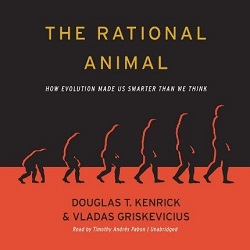What We're Reading Now
Evolutionary Framework of Decision-Making
11 December 2018
Geof read The Rational Animal: How Evolution Made Us Smarter Than We Think by Douglas Kenrick and Vladas Griskevicius and thought about how our “sub-selves” can impact the way we interpret information and make decisions.
Tags: geof read
Years ago, when my two youngest children wanted to split a treat, I used a simple approach to make sure both were satisfied with the outcome. One child would dictate how the division was made, and the other determined the terms. For example, Ian would split the donut in two and Ava would choose her half. It usually resulted in an equitable agreement with the kids trying to split the donut as evenly as possible, lest the other get the tiny half.
In The Rational Animal: How Evolution Made Us Smarter Than We Think, authors Kenrick and Griskevicius shared a similar study based on trust. Individuals had to split money with another unknown stranger by only looking at a picture of the stranger. So as the person made the decision of how to split the money, he or she looked at a photo of the stranger. The researchers then reran the experiment with a photo that morphed the stranger’s face with the face of the person dividing the money. In this instance the “stranger” received larger payoffs. Giving money to other people that resembled us activated what the authors called our kin care sub-self.

Kenrick and Griskevisius introduce the concept of “sub-selves,” evolutionary rules of thumbs that are primed by the situation in which we find ourselves. Their theory suggests there is no “I,” but instead a collection of “we” that guide our feelings and behaviors. In other words, there is not a “single executive system in our head, but different systems running different sub-programs.”
The seven sub-programs were shaped by the evolutionary success of our ancestors and include:
- The Self Protection sub-self is activated by perceived threats to our own safety. When primed we act in ways to avoid or confront the perceived threat.
- The Disease avoidance sub-self is activated by something as simple as others sneezing or coughing (or even the sight of a band-aid). When primed we act in ways designed to thwart pathogens.
- The Affiliation sub-self is triggered by anything that cues friendship (also active when friendships are threatened, or we feel exploited or lonely). When primed we act in ways that help make friends and form alliances critical to our own success.
- Status is attuned to where we are in a hierarchy, who is above and below us, and how to associate with successful others. With respect comes benefits. Our ancestors needed to manage gaining and maintaining status within their groups.
- Mate Acquisition is activated when we are deciding who would make a good partner, and how to attract that person's interest and compete against other suiters.
- The Mate Retention sub-self cues joining forces to care for offspring. It’s tuned into information about contentment of our partner and threats from others.
- Kin Care is good for offspring (and passing on your genes) and includes providing food, shelter, protection, and survival knowledge. Kin care motivates us to help our offspring and family members (and helpless strangers or pets).
The theory of sub-selves has two interesting implications. The first is that our aroused sub-self will determine how we interpret information. Two people can interpret the same event differently based on the aroused sub-self. The second implication is that the aroused sub-self influences the feelings we have and the behaviors we choose in the situation.
The next time you are in a situation and curious about the reasons you feel or behave a certain way, think about which sub-self might be activated.







Comments
Our Comment Policy:
Our blog posts are only half of the conversation. What our readers have to say is equally important to us, and we're grateful for all the comments that continue the dialog.
To ensure that the discussion here is as useful as possible to all of our readers, please be respectful of our contributors and refrain from harassing, threatening and/or vulgar language. We reserve the right to screen and remove any comments from the site. If you have a question about a comment or want to discuss our policy, please contact us. We'll talk it over.
There are no comments for this entry yet.